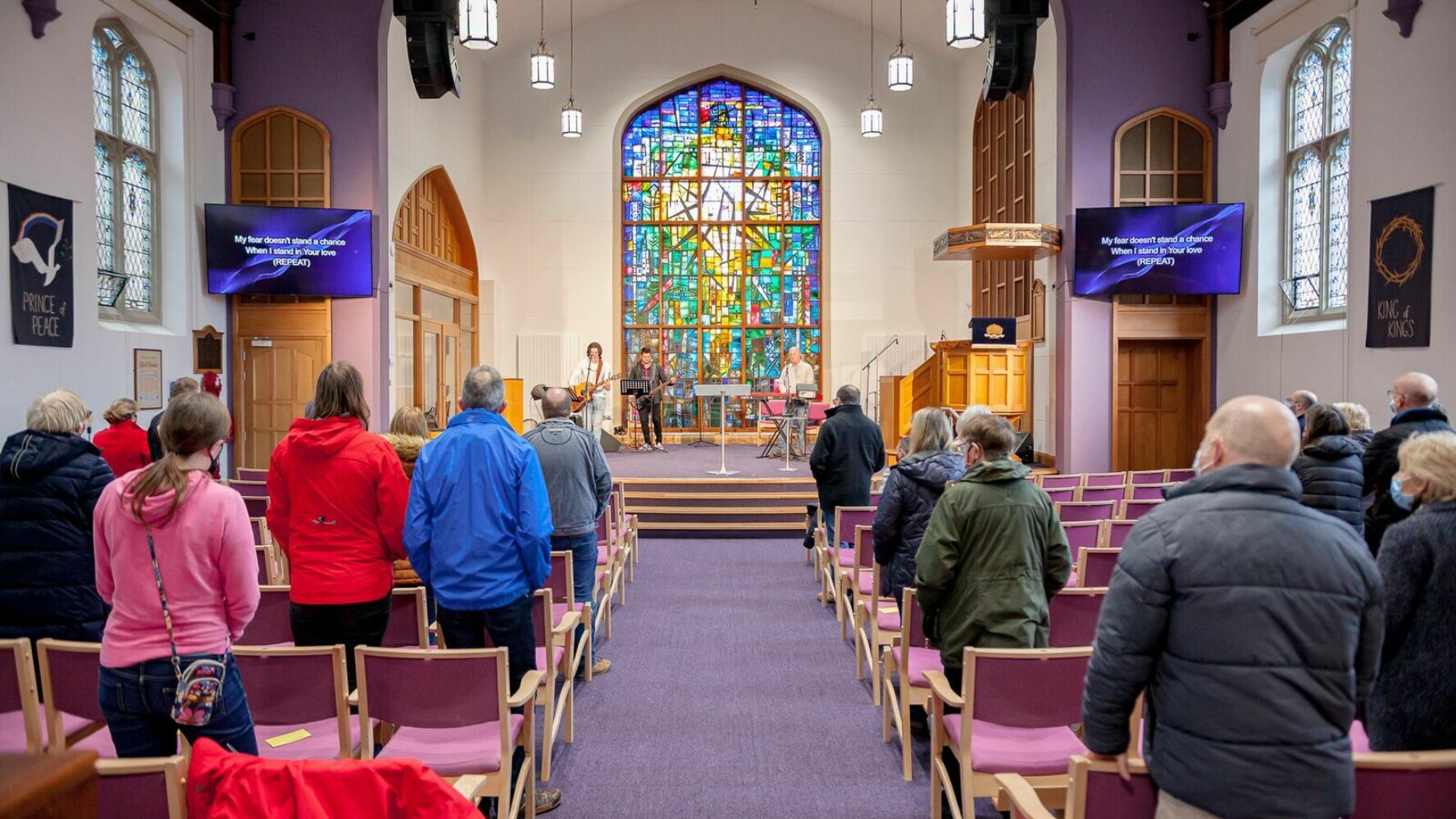
None of us can single-handedly solve the entire cost of living crisis. However, if each of us does what we can, our small but significant acts of kindness will grow into something much bigger, as well as showing God’s love to those around us.
Whether you’re looking for ideas you can do yourself, or ways your church can help with the cost of living crisis, here are just a few options to get you thinking outside the box:
1. Volunteer or adapt
If you’re part of a church community, you may already volunteer your time on Sundays or throughout the week, whether it’s serving in children’s ministry or mums ‘n’ tots groups, leading worship, or offering a warm welcome to visitors.
If you’re looking to start something new, you could ask about volunteering at your local food bank or community initiative in your area. But if you’re already really busy during the week, that doesn’t have to be a barrier to making a difference!
Volunteering doesn’t have to mean doing more things, it could simply mean looking for ways to help with the cost of living crisis that are part of your everyday life already.
For example, if you attend a church on Sundays, you could set up a ‘drop off point’ there for people to donate food and toiletries, and could drop the donations off at your local food bank every so often. If you’re able to, even adding one or two ‘to donate’ items to your usual weekly shop can make a big difference to those in need.
Another idea: offer to save your friends or neighbours some petrol by picking up their children from school when you go to pick up yours. You could even offer to have them round for dinner once a week, whether that’s just the kids or the whole family!
Basically, if you’re already going somewhere, already cooking, already shopping, you’re in a position to help with the cost of living crisis. Be as creative as you like, and just adapt what you’re already doing as an individual or church.
You don’t have to come up with any extortionate gestures; often, the simple, thoughtful things have the greatest impact.
2. Continue to run groups through school holidays
By choosing to keep running your church’s mums and toddlers group, small groups, or other gatherings for an extra week or two during the holidays, you could be offering a lifeline to those in need. Not only do these groups offer a chance to connect with others, they also often include snacks, refreshments or even a shared meal.
Many groups like this pause during school holidays, meaning those who rely on them for community, connection and even food can be left isolated and lonely.
For some, the provision of free school meals is the only way to ensure three meals a day for their children. During school holidays, it’s an extra struggle to make sure everyone is fed. On top of this, the cost of half-term activities, or even coffee with a friend, may be too much of a stretch for many – especially right now.
1 Peter 4:9 tells us to ‘offer hospitality to one another without grumbling’. Is continuing to run an existing group for a few extra sessions possible for you this winter? If so, do it! By giving just a few hours of your time, you’re offering people a safe space to connect over a nice cup of tea or even a meal.
Not only are you providing physical, emotional and spiritual nourishment, you’re allowing them to participate in an experience that back in Jesus’ day was an absolutely vital part of friendship, companionship and community.
3. Join the Warm Welcome Campaign
The Warm Welcome Campaign was set up to make sure people across the UK that are struggling to hear their homes can access warm, safe spaces for free this winter. By registering your church as a warm welcome space, you can offer people an inclusive, non-judgemental space where they can experience, quite literally, a warm welcome.
Again, this one is totally up to you. You could provide hot drinks and refreshments, or even offer free Wi-Fi and charging points for anyone needing to use the internet. Maybe your church could offer a space for prayer, quiet reflection or someone to talk to (1 Thessalonians 5:11), as well as sharing about the other free midweek activities your church or local area has to offer.
If you already offer something like this, you don’t have to start something new. By registering your church as a Warm Welcome Space, your existing initiative can become part of the official campaign, meaning people can find out about it more easily.
4. Lend a helping hand
One of the best ways you can help with the cost of living crisis is to simply ask, listen, and be present with those around you. Some people may naturally open up about the struggles they’re facing, while others may not wish to share, and in a way it doesn’t matter. You don’t need to know everything in order to help.
Remaining kind, non-judgemental and gently curious (not nosey!) allows you to notice where you could privately (see Matthew 6:1) offer a helping hand. Whether they’re just facing a one-off need or ongoing struggle is irrelevant – the point is, it’s easy to lend a helping hand in someone’s moment of need, whether the need is big or small.
Small gestures
For example, if you know your friend has an appointment during the week but isn’t sure how they’re going to get there, why not offer them a lift or some company? They might be struggling to afford transport to get there, or they might just not have planned yet. Either way, your offer of help may be much appreciated
Another small gesture could be inviting a friend for coffee, and just mentioning in advance that it’s ‘your treat’. Again, whether they’d otherwise decline as they can’t afford it right now, or whether they’d have managed to stretch to £3–4, you’ve still offered kindness and an invitation to socialise that’s not dependent on the cost.
Romans 12:10 says to ‘be devoted to one another in love’, and although Paul wasn’t exactly referring to buying coffee, it’s in the small gestures of kindness that we prove our continued loyalty and love to one another, not just the big things.
Further help with the cost of living crisis
There are plenty of practical ways you can help with the cost of living crisis directly, too: helping someone search for a cheaper mobile phone plan, or energy tariff, or taking a look at someone’s budget with them to see where they could adjust to make their money go further. Some people might be entitled to benefits they’re not already claiming, and by pointing to our benefits calculator, you could help them seek that bit of extra financial support.
Or if someone is in need of emotional support, create a list of organisations or charities you can signpost to (we have a whole list here), or offer to advocate for them at an appointment? If it’s housing or other issues, browsing what local support is available could provide a lifeline for someone who is overwhelmed with other worries going on.
Free debt help
If someone you know is in debt, CAP offers free debt help. See if there is a local CAP centre in their area by using our postcode search tool, and then pass on our details for them to give us a call. You could even offer to support them by being with them as they phone us.
Often, we best help one another out in our moments of need just by listening and responding to what’s in front of us. That might look like offering practical help, emotional support or helping someone to access resources and tools.
5. Be a friend
We can’t all do everything, but God has gifted us with the unique skills and personality to do what he’s called us to do.
To help with the cost of living crisis, you don’t need all the money in the world, you just need to understand that Proverbs 17:17 means we are equipped to help each other in times of need and adversity like this one. God goes as far as to say we were born for it!
By simply being a friend, you can positively impact someone’s whole experience of their current situation. A non-judgemental listening ear makes all the difference, even if it doesn’t fix the challenges someone is facing.
By creating a safe space to talk and process, and being there in lots of different ways from listening to offering practical help or a hug, you are offering safety and security in an otherwise uncertain time.
It might not seem like you’re doing much, but it might just make all the difference to someone’s mental health, extending to them a lifeline of hope that has been absent for potentially some time.



